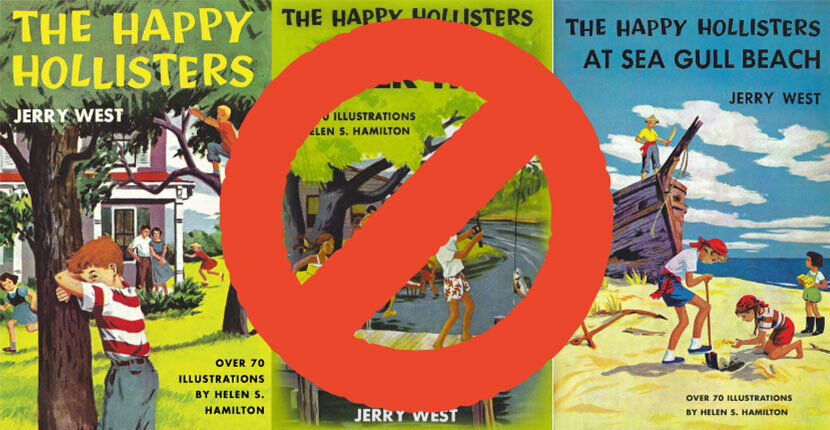Can you imagine The Happy Hollisters ever ending up on a list of banned books? Since the books revolve around wholesome characters, classic family values, and child-friendly adventures, it’s hard to imagine them being banned by schools or libraries for being inappropriate as are so many other books. Banned Books Week, which is celebrated annually during the last week of September, is a great opportunity to learn more about which books are banned and why.
Why Do Books Get Banned?
When a book is banned, it means that someone—often at a school or library—deemed something in the book inappropriate for inclusion in their classroom, library, or form of distribution. For example, if parents complain about a certain book on their child’s summer reading list, it could lead to that book getting removed from the list, or even banned entirely by the school or school district.
Books typically get banned in an attempt to shield young readers from potentially inappropriate topics. Some common reasons for banning books include portrayals of:
- Sexual content
- Violence
- “Damaging lifestyles,” like drug use
- Situations where racism is encouraged toward certain groups
- Bad language or slurs directed at certain groups
Other times, a book might be banned for a certain age group. For instance, a book with a scene of graphic violence might be considered appropriate for a high school senior, but harmful for a seventh grader.
Banning books is a complex subject, since what is considered inappropriate by one person might be seen as perfectly fine by another. A great example of this is the Harry Potter series. While this is a beloved classic for many families, others see the story of a young wizard as a promotion of witchcraft, which may go against their religious beliefs. This makes it difficult for librarians, school officials, or others to handle the topic of banning the book, since people have many different beliefs about the subject matter and whether or not it belongs on their children’s shelves.
When issues like race, religion, and sexuality are brought into play, the discussions often become heated, since people tend to have strong opinions about what is acceptable for their family. Books centered around politically sensitive topics, such as The Hate U Give by Angie Thomas, which deals with themes of police brutality, and Alex Gino’s George, which features a transgender protagonist, often wind up in discussions of banned books.
Commonly Banned Books
So what are some of the most commonly banned books? You might be surprised by some of the titles on this list compiled by the American Library Association:
- To Kill A Mockingbird by Harper Lee
- Of Mice and Men by John Steinbeck
- The Handmaid’s Tale by Margaret Atwood
- The Hunger Games by Suzanne Collins
- The Kite Runner by Khaled Hosseini
- Captain Underpants by Dav Pilkey
- The Adventures of Huckleberry Finn by Mark Twain
- The Catcher in the Rye by J.D. Salinger
- 1984 by George Orwell
- I Know Why the Caged Bird Sings by Maya Angelou
Many of these books are considered longstanding literary masterpieces, while others, like The Hunger Games, have experienced massive success in modern times. However, since many of these books also deal with controversial topics or feature “of-their-time” language that is considered offensive today, they are frequently the targets of book bans.
Hear Jerry West’s (Andrew Svenson’s) Take on Banned Books
While The Happy Hollisters series has never faced a book ban, similar series like Nancy Drew and the Hardy Boys have been “shunned” in the past by librarians who felt that the popular books had little, if any, literary merit. Author Andrew Svenson, who wrote The Happy Hollisters as Jerry West, also outlined, wrote and edited for Nancy Drew and The Hardy Boys, and he shared his thoughts about the criticism of these books in a 1975 interview with KMOX Radio in St. Louis. (You’ll find the interview at the bottom of our “About the Author” page; click here to listen.)
Whether you adore a banned book or agree that certain books shouldn’t be on children’s reading lists, Banned Books Week is a great time to follow Svenson’s lead and have a discussion about banned books and decide what’s right for your family!
by Libby Svenson Kennedy
Sources:
Research notes, Andrew Svenson Archives of The Hollister Family Properties Trust
May, Roger B. (1975) “Durable Heroes: Nancy Drew and Kin Still Surmount Scrapes—and Critics’ Slurs.” The Wall Street Journal. January 16. Eastern Edition
https://libguides.asu.edu/ChildrensYoungAdultLiterature/BannedBooks
https://www.ala.org/advocacy/bbooks/frequentlychallengedbooks/decade2019

